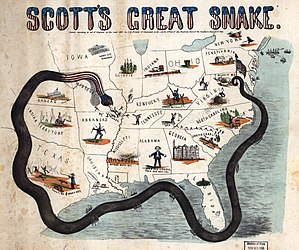This article needs additional citations for verification. (May 2022) |


| Part of a series on |
| War (outline) |
|---|
 |
A blockade is the act of actively preventing a country or region from receiving or sending out food, supplies, weapons, or communications, and sometimes people, by military force. A blockade differs from an embargo or sanction, which are legal barriers to trade rather than physical barriers. It is also distinct from a siege in that a blockade is usually directed at an entire country or region, rather than a fortress or city and the objective may not always be to conquer the area.
A blockading power can seek to cut off all maritime transport from and to the blockaded country, although stopping all land transport to and from an area may also be considered a blockade. Blockades restrict the trading rights of neutrals, who must submit for inspection for contraband, which the blockading power may define narrowly or broadly, sometimes including food and medicine. In the 20th century, air power has also been used to enhance the effectiveness of blockades by halting air traffic within the blockaded airspace.
Close patrol of hostile ports, in order to prevent naval forces from putting to sea, is also referred to as a blockade. When coastal cities or fortresses were besieged from the landward side, the besiegers would often blockade the seaward side as well. Most recently, blockades have sometimes included cutting off electronic communications by jamming radio signals and severing undersea cables. Blockades often result in the starvation of the civilian population, notably during the blockade of Germany during World War I and the blockade of Biafra during the Nigerian Civil War.[1]
According to modern international law, blockades are an act of war.[2] When used as a part of an effort to starve the civilian population, they are illegal as part of a war of aggression[3] or when used against a civilian population, instead of a military target.[4] In such case, they are a war crime and potentially a crime against humanity.[5][6]
- ^ Nicholas Mulder, Boyd van Dijk (2021). "Why Did Starvation Not Become the Paradigmatic War Crime in International Law?". Contingency in International Law: On the Possibility of Different Legal Histories. Oxford University Press. pp. 370–.
- ^ Russell, Alison Lawlor (2023). "Digital Blockade or Corporate Boycott?: A New Tactic of War". Æther: A Journal of Strategic Airpower & Spacepower. 2 (1): 16–30. ISSN 2771-6120. JSTOR 48714684.
- ^ Dannenbaum, Tom (28 July 2023). "What You Need to Know: International Humanitarian Law and Russia's Termination of the Black Sea Grain Initiative". Just Security. Retrieved 1 November 2023.
- ^ "Rule 53. Starvation as a Method of Warfare". ihl-databases.icrc.org. Retrieved 1 November 2023.
- ^ Dannenbaum, Tom (2021–2022). "Siege Starvation: A War Crime of Societal Torture". Chicago Journal of International Law. 22: 368.
- ^ "Unlawful Blockades as Crimes Against Humanity | ASIL". www.asil.org.